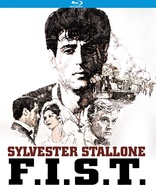F.I.S.T. Blu-ray Movie
HomeF.I.S.T. Blu-ray Movie 
Kino Lorber | 1978 | 145 min | Rated PG | Feb 10, 2015Movie rating
7.1 | / 10 |
Blu-ray rating
| Users | 4.0 | |
| Reviewer | 4.0 | |
| Overall | 4.0 |
Overview
F.I.S.T. (1978)
The charismatic Johnny Kovak joins the Cleveland chapter of a labor union in the 1930s and rises through the organization. As his power grows, his methods become more volatile, and a senator mounts a campaign to investigate his potential ties to the Mafia.
Starring: Sylvester Stallone, Rod Steiger, Peter Boyle, Melinda Dillon, David HuffmanDirector: Norman Jewison
| Drama | 100% |
Specifications
Video
Video codec: MPEG-4 AVC
Video resolution: 1080p
Aspect ratio: 1.85:1
Original aspect ratio: 1.85:1
Audio
English: DTS-HD Master Audio 2.0 (48kHz, 16-bit)
Subtitles
None
Discs
25GB Blu-ray Disc
Single disc (1 BD)
Playback
Region A (locked)
Review
Rating summary
| Movie | 3.5 | |
| Video | 4.0 | |
| Audio | 4.0 | |
| Extras | 3.5 | |
| Overall | 4.0 |
F.I.S.T. Blu-ray Movie Review
Reviewed by Brian Orndorf February 1, 2015Before “Rocky,” Sylvester Stallone was just an average working actor in Hollywood trying to make a living. After “Rocky,” he was transformed into a screen legend, riding a reputation as a cinematic hero to box office success and Oscar gold, making him one of the biggest stars of the 1970s. The follow-up to his little movie that could was 1978’s “F.I.S.T.,” a feature that attempts to deliver a disquieting look at the rise of the labor movement in America, co-scripted by Joe Eszterhas (his first produced work) and directed by Norman Jewison. With Stallone’s participation, “F.I.S.T.” is more of a light slap when it comes to challenging methods of union influence, instead trying to find heroism in this thinly-veiled take on the Jimmy Hoffa story. Numerous elements flatline in the film, but Jewison does pull a fine performance out of Stallone, padding the picture with enough talent and sequences of fiery indignation that propel the overlong, undernourished effort along.
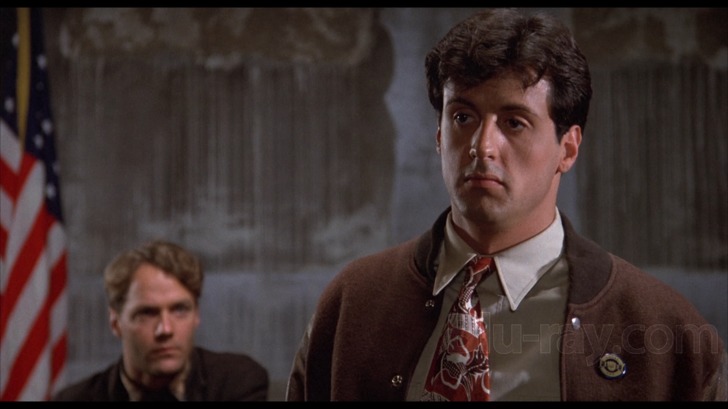
An immigrant trying to make a buck in America during the Depression, Johnny Kovac (Sylvester Stallone) is appalled by the working conditions provided to him and his fellow man. Refusing to accept slave wages for long hours and tolerate bosses who show no respect for the common man, Johnny takes an offer to join the “Federation of Inter-State Truckers” organization as a recruiter, sent around the Cleveland area to spread word of the union’s bargaining power. With best friend Abe (David Huffman) by his side, Johnny reveals himself to be a most persuasive employee, building the union into a powerhouse that threatens to shut down businesses with strikes when management refuses to meet demands. Also on Johnny’s mind is Anna (Melinda Dillon), a simple woman wooed by the forceful man, giving him a romantic outlet as the pressures of union duty increase. Helping to build an empire that triggers the curiosity of Senator Madison (Rod Steiger), Johnny is soon hit with the realization that F.I.S.T. was built on shaky ground, finding past ties to organized crime figure Babe Milano (Tony Lo Bianco) coming back to haunt him.
“F.I.S.T.” aims to achieve an immense scope, rivaling “The Godfather” as the screenplay details the pitfalls of corruption, crime, trust, and love during a time of seismic change in America. Jewison launches the picture broadly, calling in a thundering score by Bill Conti to lead the charge as Johnny comes into view, introducing a young man sick and tired of the abuses endured at a shipping facility, aware that his employment options are few and far between in this dark time. He’s eager to fight but doesn’t have the direction, foolishly trusting management types just waiting for the chance to stab him in the back, making it impossible for workers to gain ground and receive proper care, including insurance options and fair pay for reasonable hours. There’s little dramatic grit established in the opening act, but “F.I.S.T.” does have moxie, led by Stallone’s utterly committed performance, studying Johnny’s frustration and growing confidence with negotiation as he joins the labor organization and begins to see real change with the truckers he encounters daily.
Stallone co-scripts “F.I.S.T.,” and the divide between that star’s work and Eszterhas’s writing is uncomfortably evident. One side of the feature concerns hard men and heated backroom discussions, watching the shape of the union begin to form, with all its power plays and seepage into organized crime. There’s also an element of violence, with Johnny leading strikes across the city, practically welcoming management’s thuggish response as Pinkerton goons go after the employees, hoping to pound them into submission. Johnny and the union return fire with their own level of aggression, which transforms the humble man’s name into legend, riding his notoriety into leadership, challenging the established chain of command as the decades pass, which eventually leads to interest from Washington. All the edges seem to belong to Eszterhas, who brings a lived-in quality to the movie. The love story is squeezed in by Stallone, who turns Johnny into a wisecracking suitor determined to land Anna as his girlfriend, knocking the effort off-balance with such calculated plotting. Johnny is much more interesting as a flawed, dangerous man who doesn’t understand his own power. Stallone’s work to make the union leader sympathetic and gallant doesn’t fit the tone of “F.I.S.T.”
Johnny’s arc is also served well by Abe’s presence, who acts as his conscience as the leader samples corruption to keep the machine oiled. The friendship never finds its intended footing, but “F.I.S.T.” benefits from the little screen time Abe is given, adding a sophisticated psychological element to a movie that always seems conflicted about Johnny’s ultimate position as a force of power. “F.I.S.T.” is critical of union dealings, but only peripherally, afraid to sink its teeth into troublesome behavior and bad decisions that stained the movement.
F.I.S.T. Blu-ray Movie, Video Quality 
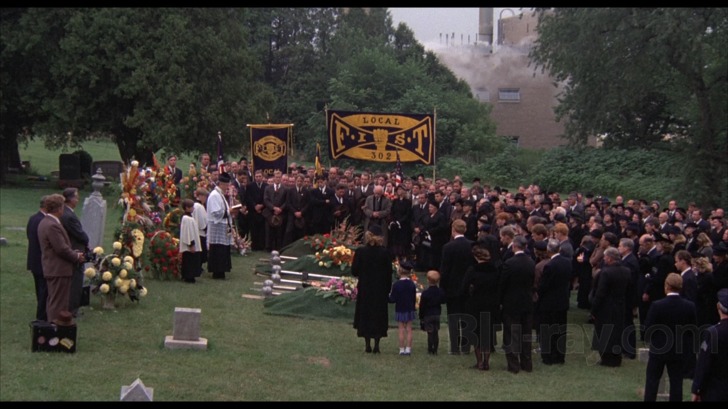
The AVC encoded image (1.85:1 aspect ratio) presentation does show a gentle use of filtering, finding grain muted but still present. Sharpness is satisfactory for this style of cinematography, making fine detail approachable, capturing the particulars of group sequences, with signs and weapons easily appreciated. Facial nuances are also on view, permitting a crisp look at the varied cast, while textures on period costumes are encouraging. Delineation isn't lost, holding frame information as the effort works through evening sequences. Print damage is present, finding scratches and speckling on view, along with a few chemical burns, but rarely does anything distract. Colors are generally healthy, with neon signage and bright interiors capturing a satisfactory range of hues. Skintones are natural.
F.I.S.T. Blu-ray Movie, Audio Quality 
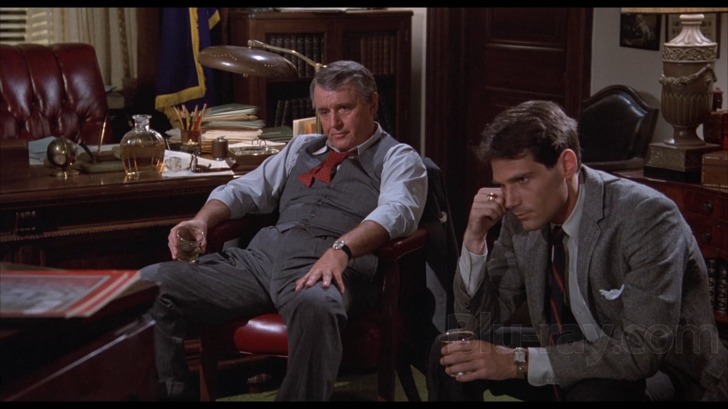
The 2.0 DTS-HD MA track does contain a mild hiss throughout the listening experience, but no overt distortion. Dialogue exchanges are clear and purposeful, preserving dramatic intent as the action moves from hushed boardroom encounters to fiery speeches, never leaving a comfortable range outside of a few crispy highs. Scoring is comfortable and confident, bringing up the energy of the film without crushing the human element. Atmospherics are adequate for this type of limited scope, while violent clashes carry acceptable heft, highlighting the smashing of bodies and the tapping of baseball bats.
F.I.S.T. Blu-ray Movie, Special Features and Extras 
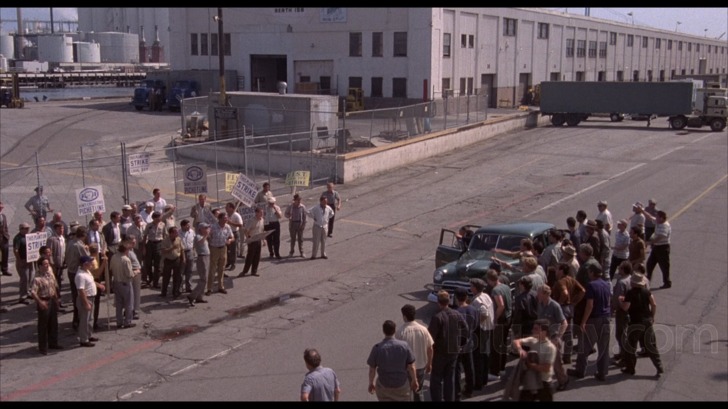
- "The Fight for F.I.S.T." (18:13, HD) is an illuminating sit down with co-writer Joe Ezterhas and director Norman Jewison. Sharing the origin story of the production, Ezterhas walks the viewer through the story and screenplay's development, recalling the excitement behind his first Hollywood screenplay. Jewison also recounts his initial interest in the work and the picture's specific visual needs, requiring the shoot to take place in Iowa. Most interestingly, both men are quite candid about Sylvester Stallone's participation, greeting a massive star who immediately altered the script, refused to follow the character's tragic arc, and subtlety disowned the effort when it tanked commercially and critically. The honesty (respectful but stinging) displayed here makes the featurette a must-see.
- And a Theatrical Trailer (2:29, SD) is included.
F.I.S.T. Blu-ray Movie, Overall Score and Recommendation 
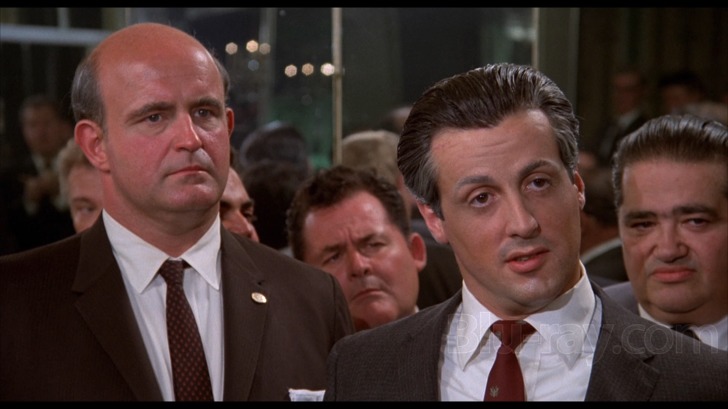
"F.I.S.T." has moments of cinematic bigness that work, also populated with enough beefy actors (including Peter Boyle, Karl Malden, and Brian Dennehy) to create a credible atmosphere of intimidation. In the end, the shift toward tragedy and mystery (following the tale of Hoffa, who was better served in Danny DeVito's 1992 bio-pic) deflates the movie, finding Jewison's intent to slice open Johnny and inspect his conflicted soul failing to materialize under Stallone's newly acquired influence. It's certainly an engaging picture, bold and bright, but as a portrait of the labor movement tumultuous rise? It walks away from the bargaining table too soon.
Similar titles
Similar titles you might also like

Zipper
2015

True Believer
Retro VHS Collection
1989

Kid Cannabis
2014

Concussion
2015

Phantom Punch
2009

Equity
2016

White Boy Rick
2018

Any Given Sunday
15th Anniversary Edition | Director's Cut | Includes Theatrical Cut DVD
1999

Lords of Dogtown
Unrated Extended Edition
2005

The Vanishing
2018

Reservation Road
2007

Find Me Guilty
2006

Raging Bull 4K
1980

Black and Blue
2019

A Good Person
2023

A Civil Action
1998

White Nights
1985

Searching for Bobby Fischer
1993

Stand and Deliver
Warner Archive Collection
1988

Throw Momma from the Train
1987
